Top 10 Food Safety Courses

To help you with your food safety training, we’ve made a list of the best food safety courses that you can use to train your hospitality staff. These courses discuss topics such as how to comply with food safety standards, how to prevent food poisoning, and how to deliver a good food experience.
1. Food Safety Standards (US, UK or AU)
Food Safety Standards (US, UK, or AU) by EdApp is a five-microlesson course on the food code and safety laws in the United States, the United Kingdom, and Australia. It includes great tips and tricks that can help you manage a safer restaurant or food company for your guests.
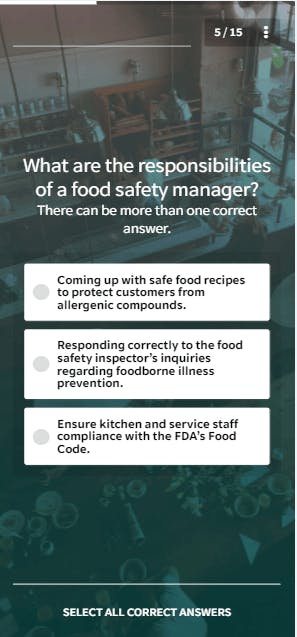
While food safety rules can vary wherever you go, this food safety course focuses on a set of guidelines that are followed by all food businesses across the world. This includes things like the right cooking temperature to kill germs, methods for sterilizing food-contact surfaces, and control mechanisms to restrict bare-hand contact with the food supply chain. At the end of the course, your workers' knowledge is tested with a quiz to check whether they fully understand the concepts or not.
Quickly deliver this food safety course using EdApp's free course library. Courses and modules are completely customizable and re-brandable to meet the demands of your organization. Editing is made easier with the help of its intuitive drag-and-drop creator tool.
Cost: Free
Scope: Developing a HACCP plan, US food safety standards, AU food safety standards, UK food safety standards
Get started on your food safety training by signing up for EdApp today.
2. Food Contamination
EdApp’s Food Contamination course teaches what your team needs to know about kitchen cleaning procedures and safe food handling. Your workforce will learn what is food contamination and why it should be avoided at all costs. Learners will discover the multiple types of contamination, such as chemical, physical, allergen, and biological. If you want your staff to learn about all of these, this is the course you want to have them enrolled in. However, we all know that adults have a short attention span. Given that, it’s more beneficial if you use an interesting course for workplace learning, and EdApp made this course very interactive and engaging, so no worries there.
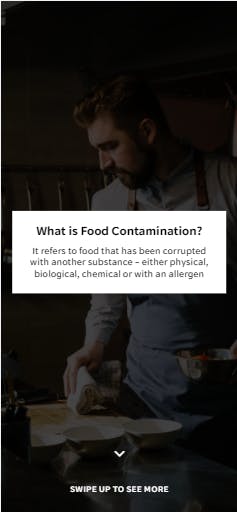
Unique feature/s of the course:
- The course is completely editable so, tailoring it for your team will not be an issue.
- One of the few courses to cover allergens as it relates to food contamination.
Pro/s to using this course to train your team:
- Your staff will have 24-hr access to the material. They will also be able to study on any device.
- These micro-lessons are digestible and perfect for your team that may not have a lot of free time on their hands.
Why you should learn with it:
This course covers proper cleaning procedures that your kitchen staff should know if they want to maintain a safe environment for preparing food.
Proper food storage may seem to be a simple issue to tackle, but as in most circumstances, knowledge is key. Teach your team how to correctly store raw meat, poultry, and seafood in the refrigerator.
3. Food Safety Hazards
If you’re on the lookout for a course that will teach your team all the different types of food safety risk factors and food hazards that can cripple your business, EdApp’s Food Safety Hazards is perfect to include in your training program. It will take your staff through the food safety risk factors and four types of food hazards (allergenic, physical, biological, and chemical). EdApp went to the best sources, including government agencies from across the globe, that carry this information and made sure it is up to date, relevant, and accurate.
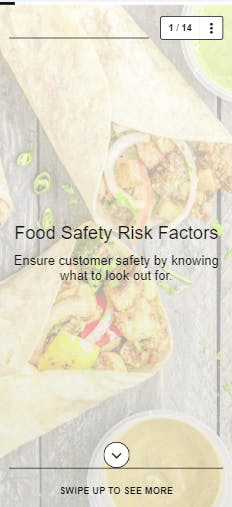
Unique feature/s of the course:
- The course helps your team understand food safety risks by breaking down stats from the WHO.
- There is an editable quiz at the end that you can use to test your staff’s understanding of the material.
Pro/s to using this course to train your team:
You don’t have to worry if you have a multilingual team spread across the globe as the material can be translated to over 100 languages with a click of a button.
Why you should learn with it:
Your customers should be the #1 priority, and this course will make sure they are protected from food hazards by equipping your team with the necessary knowledge to carry out their jobs.
The sources used to compile the course are reputable and thoroughly vetted to ensure that all of the materials are of international standards.
4. Food Runner’s Guide
The Food Runner’s Guide by EdApp highlights an area in the food industry that often gets overlooked—food runners. Don’t let the jargon mix you up, we are talking about waiters or servers. In addition to traditional server training, this course covers how food should be transported safely from kitchen to customer by your waiters. It also discusses presenting a clean look to customers to maintain presentability. This course can be fully edited to show how being clean will keep food safe. e.g, by talking about keeping nails trimmed to avoid transmission of contaminants to food.

Unique feature/s of the course:
The course helps your employees to understand how being clean and presentable makes your customers have a better experience which means return business for the company.
Pro/s to using this course to train your team:
- One big advantage to using this course is the fact that it has gamification examples that will keep the attention of your staff.
- Another advantage is being able to use Brain Boost which uses spaced repetition. This feature provides lessons at increasing levels so the knowledge gets committed to the long-term memory.
Why you should learn with it:
If you want your team to learn about how to properly bussing tables, conduct, hygiene, and how they all relate to food safety, you should sign them up for this course.
5. Level 3 food safety online training
Leaders should lead from the front. As a supervisor or manager in the food business, the CPD accredited course is for you to get the needed information to use to train your employees. This course is targeted at leaders, however, it can be useful to all kitchen staff members. It offers self-paced learning and has a study time of 9-14 hours.
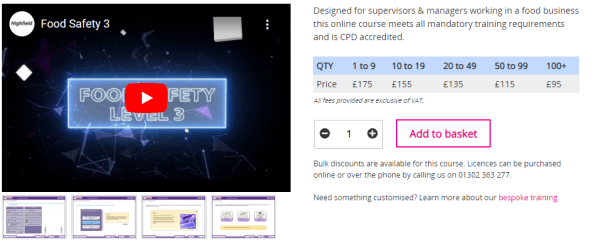
Unique feature/s of the course:
- The course covers over 12 topics that will lead to a safer food environment
- The course can be licensed out by Highfield eLearning
Pro/s to using this course to train your team:
- If you train your team with this course, they will be able to study at their own pace on a wide range of devices.
- Due to the depth of the material covered, anyone on your team can benefit from the course and not just specific team members.
Con/s to using this course to train your team:
Unfortunately, the course is not free and may be costly depending on your team’s size
Why you should learn with it:
- You can use this course if you want your team to learn about food safety standards such as HACCP
- The course comes with quizzes and assessments
- Compelling imagery is included to foster understanding
6. ISO 22000:2018 Food Safety Management Systems Introduction
If you are a leader or looking to become a leader in the food industry, this course is one for you to look into. The aim of this course is to teach you the requirements of ISO 22000:2018. With this knowledge, you will be able to implement, continually improve, and manage food safety systems in your company. Fortunately, for potential students, no prior knowledge is required to enroll in this course.
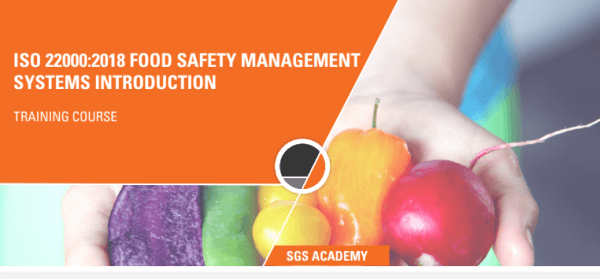
Unique feature/s of the course:
It teaches the knowledge required to achieve ISO 22000:2018 compliance
Pro/s to using this course to train your team:
- This course teaches HACCP system guidelines.
- The course incorporates the PDCA model and risk-based thinking in management system processes.
Con/s to using this course to train your team:
The entire course is not available online
Why you should learn with it:
- The course content includes material that will teach risk-based thinking approaches to food safety.
- You will learn to understand and appreciate leadership commitment and responsibilities.
7. Certified Professional – Food Safety (CP-FS)
Here we have a course that caters to people who want to acquire the CP-FS credential. These are usually individuals whose jobs involve the safety and protection of food. The Certified Professional – Food Safety course was developed by industry experts in a way that will teach your team food safety for the retail environment. This is one of the courses that can be used to prepare candidates for the National Environmental Health Association’s CP-FS credential examination.
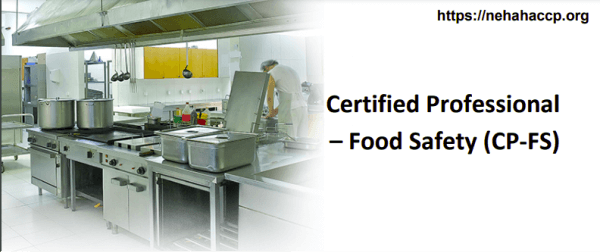
Unique feature/s of the course:
The course serves as a good preparation tool for an important food safety exam.
Pro/s to using this course to train your team:
- The 40 lessons in the course are self-paced so you can study in your free time.
- There is an exam at the end of the course that consists of 50 multiple choice questions that will test your understanding.
Cons to using this course to train your team:
The course is not free
Why you should learn with it:
- Anyone in the food industry space can use this course to learn the causes and prevention of foodborne illness.
- You and your team will learn about pest control and how to conduct facility plan reviews.
8. HACCP – Managing Hazards at the Retail Level
This HACCP course is an online self-paced learning tool on the HACCP System and its prerequisites. If your frontline team in a food retail business needs to be trained to meet HACCP requirements, this is a course you can enroll them in. It will be useful for Frontline retail personnel, Retail quality control, and assurance personnel, food safety personnel, and retail production managers and staff. The program includes HACCP training courses 2017 and beyond.

Unique features of the Course:
- This course covers HACCP prerequisites that many others do not.
- Another unique teaching point covered in this one is record keeping.
Pro/s to using this course to train your team:
Your entire team can train with this course, so you will most likely not need to use multiple materials.
Con/s to using this course to train your team:
The course is very long with 14 modules that, on average, lasts up to 1.5 hours each.
Why you should learn with it:
You should have your team learn with this course if you want them versed on Food safety hazards, HACCP principles, how to conduct a hazard analysis, and open up to develop corrective actions.
9. Diploma in Food Safety
This diploma course runs between 15-20 hours and is CPD accredited. Staff members who participate in this course will learn about proper hygiene and pest prevention as ways to keep food safe. Other important topics such as foodborne illnesses, food purchasing, and food service accidents are covered. The course is currently offering a 10% discount on its certificate. If you are an aspiring food safety manager in a food processing plant, restaurant, or any other type of food business, you can certainly benefit from this course.

Unique features of the Course:
- One of the few courses that cover food safety as it relates to ice, steam, and water quality.
- Another unique teaching point from this course is the information provided for setting up a cleaning schedule
Pros to using this course to train your team:
- After completing the course, you will have an option to get an Alison diploma that can be used to improve your resume.
- Three diploma options are available (digital, framed, physical).
Cons to using this course to train your team:
- You will need to pay for your certificate even though the course is free to enroll in and study.
- The course is lengthy and time-consuming for busy professionals.
Why you should learn with it:
- After completing the course, your team will understand how to control food hazards and allergens.
- Managers will understand how to maintain an effective incident management system.
10. ISO 22000:2018 Food Safety Management Systems Internal Auditor
If you are looking for a course to train internal auditors in the food safety space, this one does exactly that. The course equips learners with the tools required to do audits on ISO 22000 food safety systems and then make reports on the effectiveness of these systems under ISO 19011. It is not as short as others on this list, but for an auditing course, it is not too long. There are quite a bit of knowledge requirements for this course, so it’s best to check what they are before enrolling your team.
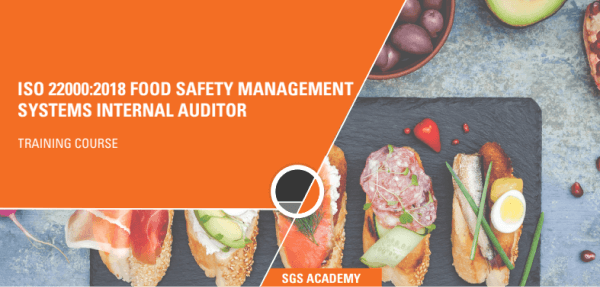
Unique feature/s of the Course:
Designed for professionals in food safety auditing roles.
Pros to using this course to train your team:
- Learners who pass the course assessment at the end will receive a certificate.
- The course explains to your staff the role of an internal auditor.
Cons to using this course to train your team:
- The course is not fully available online.
- A lot of prior knowledge is needed to enter the course.
Why you should learn with it:
- If you want a certified auditor that audits for continual improvement, you can enroll a staff member.
- Learners will learn Process-Based Food Safety Management Systems.
11. Food Poisoning (Foodborne Illnesses)
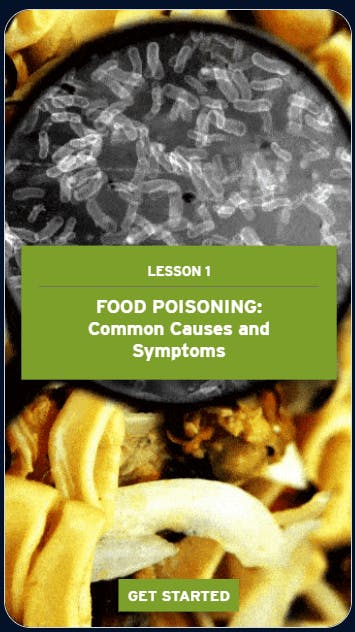
Use EdApp's Food Poisoning course to train your restaurant staff about the most common forms and causes of food poisoning, as well as how to avoid them. When they complete this course, you can be confident that the food or beverage they offer or serve won't harm or endanger your guests. The food safety program also explains the key differences between bacteria, viruses, and toxins, as well as how each of them can cause food poisoning.
Cost: Free
Scope: Food poisoning's most common causes and symptoms, pathogens in food, food Poisoning Prevention
You might also be interested in:
Author
